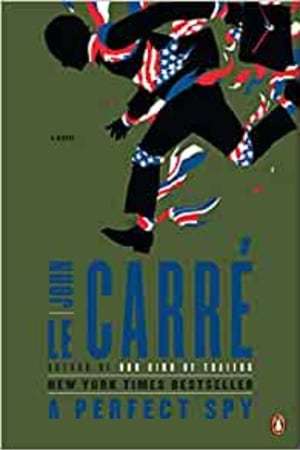Thrillers & Suspense
- Publisher : Penguin Books; Reprint edition
- Published : 20 Jul 2011
- Pages : 624
- ISBN-10 : 0143119761
- ISBN-13 : 9780143119760
- Language : English
A Perfect Spy: A Novel
"The best English novel since the war." -- Philip Roth
Over the course of his seemingly irreproachable life, Magnus Pym has been all things to all people: a devoted family man, a trusted colleague, a loyal friend-and the perfect spy. But in the wake of his estranged father's death, Magnus vanishes, and the British Secret Service is up in arms. Is it grief, or is the reason for his disappearance more sinister? And who is the mysterious man with the sad moustache who also seems to be looking for Magnus?
In A Perfect Spy, John le Carré has crafted one of his crowning masterpieces, interweaving a moving and unusual coming-of-age story with a morally tangled chronicle of modern espionage.
Editorial Reviews
"Le Carré's best book, and one of the finest English novels of the twentieth century."-Philip Pullman
"The best English novel since the war."-Philip Roth
"Brilliantly written."-The Washington Post
"Le Carré's best book, one of the enduring peaks of imaginative literature in our time."-Los Angeles Times
"The best English novel since the war."-Philip Roth
"Brilliantly written."-The Washington Post
"Le Carré's best book, one of the enduring peaks of imaginative literature in our time."-Los Angeles Times
Readers Top Reviews
Ayrshire DavieJRF
I have seen many adaptations of le Carre stories on tv and film but this is the first one I have read. I know his prose style is admired by many people but I found it not to my taste. I was frequently confused by the way the narrative jumped from present to past and back with little or no warning. It interrupted the flow for me. I found the dialogue a bit confusing too. There were times when I wasn't sure who was speaking and had to backtrack to work it out. I suppose I'm just not tuned in to his style of writing. Maybe if I tried another story I could get a better insight into his work.
Luke DennisonAyrs
I try not to get influenced by reviews or sound-bites but the cover proclaims this to be Le Carre's finest novel and so being a massive fan of the great mans I couldn't but help get excited. For the first half of this I was underwhelmed. Where was this masterpiece, his finest novel. It wasn't here. As time passed and I kept reading I began to forget about the expectation and enjoyed it for what it was a very good novel and decent by the very high standards set by this fantastic writer. This story unravels slowly, split between the past and the present and as much as I liked the back story it didn't have that profound quality that Le Carre's best writing has. personally I found the back story of Pyms childhood (which gets far more pages than the spy story) didn't really didn't deserve the time that it got, but that is just me and my take on it. Overall, good but by no means great Le Carre.
Kindle Luke Denn
Where to start? I had read The Pigeon Tunnel, Le Carre's life stories, and been smitten by his father, conman extraordinaire, described as the inspiration for Rick T Pym in A Perfect Spy. Le Carre treats all his characters with utmost respect and love; downright criminals are allowed their own justification, everyone is permitted a degree of mixed thought and dissembling, their private and their public persona need not accord. This thorough analysis of the genesis of a spy and how a basically good man might become a traitor with the assistance of family, friends and his own intelligence bosses is salutary. I am a slow reader and would normally avoid heavy novels, but the beautiful descriptions, the carefully crafted dialogue and the vivid characters kept me with it all through. I think I understand people better now.
Mindo'ermatter
While I normally enjoy Le Carré's work, this was the exception. For over 600 pages, the reader is subjected to droning scenes more appropriate to a psychoanalyst's couch than to a spy novel. Anyone who has read Le Carré's foreword or bios will know he has no love for his father. In this novel, he apparently decided to make a buck off of a catharsis. The readers should be compensated for being ad hoc therapists. The characters are cliché and, by the time you get to the end, you are glad of the outcome, if for no other reason than it can serve as a little payback for the text's monotony and whining tone. Surely there had to be a better venue for Le Carré to resolve his "daddy issues" - one that didn't drag the unsuspecting reader into a morass of self-pity and paternal loathing.


